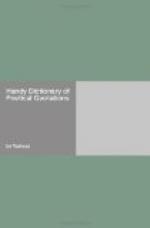Order is heav’n’s first law; and this confest, Some are, and must be, greater than the rest, More rich, more wise; but who infers from hence That such are happier, shocks all common sense. 1288 POPE: Essay on Man, Epis. iv., Line 49.
=Ornament.=
Thus ornament is but the guiled shore
To a most dangerous sea.
1289
SHAKS.: M. of Venice, Act iii., Sc. 2.
=Owl.=
It was the owl that shriek’d, the fatal bellman, Which gives the stern’st good-night. 1290 SHAKS.: Macbeth, Act ii., Sc. 2.
==P.==
=Pain.=
Pain pays the income of each precious thing. 1291 SHAKS.: R. of Lucrece, Line 334.
Pain is no longer pain when it is past. 1292 MARGARET J. PRESTON: Sonnet. Nature’s Lesson.
The sad mechanic exercise
Like dull narcotics numbing pain.
1293
TENNYSON: In Memoriam, Prologue, v., St.
2.
=Painter.=
With hue like that when some great painter dips His pencil in the gloom of earthquake and eclipse. 1294 SHELLEY: Revolt of Islam, Canto v., St. 23.
=Palm.=
No hammers fell, no ponderous axes rung; Like some tall palm the mystic fabric sprung. 1295 HEBER: Palestine.
=Pan.=
And they heard the words it said,—
“Pan is dead! great Pan is dead!
Pan, Pan is dead!”
1296
MRS. BROWNING: The Dead Pan.
=Pang.=
And even the pang preceding death
Bids expectation rise.
1297
GOLDSMITH: The Captivity, Act ii.
=Paradise.=
’T is sweet, as year by year we lose
Friends out of sight, in faith to muse
How grows in Paradise our store.
1298
KEBLE: Burial of the Dead.
=Pardon.=
Forgiveness to the injured does belong; But they ne’er pardon who have done the wrong. 1299 DRYDEN: Conquest of Granada, Pt. ii., Act i., Sc. 2.
=Parents.=
Great families of yesterday we show, And lords, whose parents were the Lord knows who. 1300 DEFOE: True-Born Englishman, Pt. i., Line 1.
=Parting.=
What! gone without a word?
Ay, so true love should do: it cannot speak;
For truth hath better deeds, than words, to grace
it.
1301
SHAKS.: Two Gent. of V., Act ii., Sc.
2.
They who go
Feel not the pain of parting; it is they
Who stay behind that suffer.
1302
LONGFELLOW: Michael Angelo, Pt. I.,
i.
Such partings break the heart they fondly hope to heal. 1303 BYRON: Ch. Harold, Canto i., St. 10.
=Passion.=
Fountain heads and pathless groves,
Places which pale passion loves.
1304
JOHN FLETCHER: The Nice Valour, Act iii.,
Sc. 3.
Passions are likened best to floods and streams: The shallow murmur, but the deep are dumb. 1305 SIR WALTER RALEIGH: Silent Lover.




